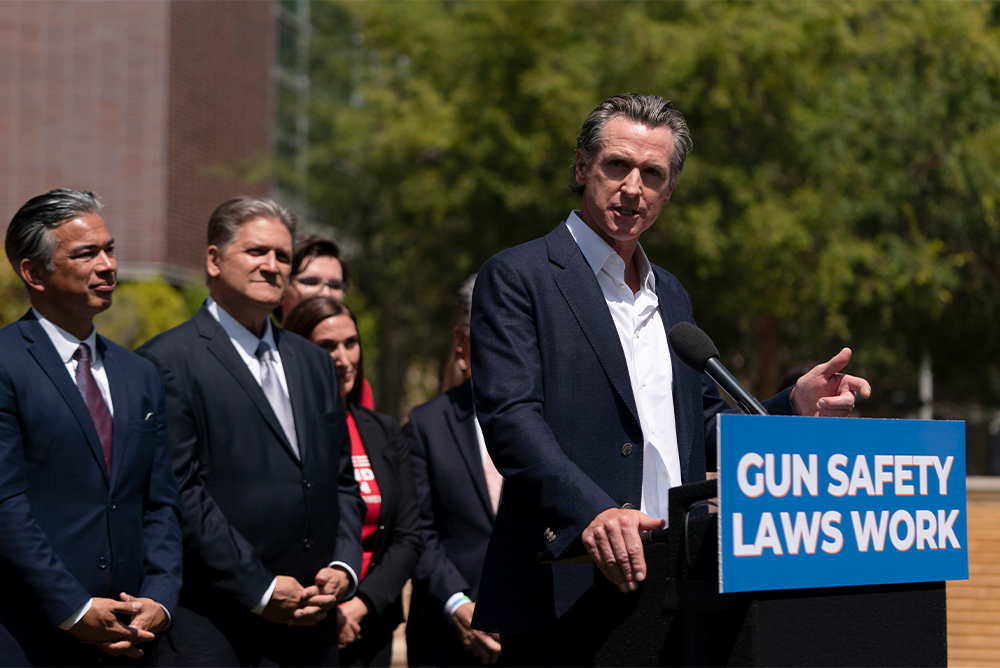
With the gun epidemic worsening, California governor Gavin Newsom’s call for a federal constitutional amendment isn’t crazy—it’s necessary, columnist Joe Mathews argues. Courtesy of AP Newsroom.
Gavin Newsom’s new campaign for a 28th Amendment is the most important political idea in the country today.
But you wouldn’t know that from reading media reports following the California governor’s proposal to enshrine four popular gun control measures in a new federal constitutional amendment.
Instead, political opponents dismissed Newsom’s proposal as at best a waste of time, and at worst a dereliction of gubernatorial duty. Reporters called it a mere tactic in his rhetorical and legal war with the red states. Republicans labeled it a distraction from his job running California. Editorialists wrote that it was crazy, because, as the San Jose Mercury News argued, it’s virtually impossible to change the Constitution.
In truth, such objections are far crazier than Newsom’s amendment. The governor isn’t just taking on the American addiction to violence. He’s taking on flaws in the U.S. Constitution that impact his ability to govern, and keep Californians safe.
It’s hard to think of a policy this country needs more than constitutional controls on firearms. The United States is awash in guns—Americans own nearly half of the 857 million civilian-held guns on Earth. And gun ownership and permissible gun laws have created an endless epidemic of gun violence. The U.S. has a gun homicide rate more than 25 times that of other high-income countries, and a gun suicide rate more than 10 times higher.
And the epidemic is getting worse, especially among young people. In 2020, gun violence overtook car accidents to become the No. 1 cause of death for U.S. children and adolescents.
Instead of trying to reverse this epidemic, the national government and many state governments are making it worse, by reducing regulations. The U.S. Supreme Court, along with conservative judges at lower levels, have reinterpreted the Constitution to throw out gun control laws in cities and states.
One of those states is California, which has had lower rates of gun violence than more pro-gun states thanks to laws under attack, like a 10-day wait on most firearm purchases.
In this context, Newsom’s decision to pursue the 28th Amendment is not some political choice—it’s a job requirement. The governor is supposed to prevent Californians from being killed. And he’s supposed to protect laws that protect public safety. Both are under threat.
As Assemblymember Reggie Jones-Sawyer, who is working with the governor to draft the amendment, has said, “We cannot stand idly while courts roll back our work and diminish the ability of our Legislature to keep Californians safe. This bold but fair resolution calls on other states to join us in protecting some of the most effective ways of reducing gun violence.”
If anything, the Newsom amendment is too modest. Rather than the repeal of the Second Amendment our country needs, the governor’s measure is limited to four politically popular measures that should reduce gun violence:
-universal background checks (which would reduce violent crime)
-raising the firearm purchase age from 18 to 21 (which would reduce suicides),
-firearm purchase waiting period (which would reduce all sorts of gun deaths)
-assault weapons ban (which might make mass shootings less common and deadly).
What is boldest about the amendment is the method Newsom is advocating for its passage: using a provision in Article V of the Constitution that allows states to call a Constitutional Convention. Thirty-four states must support such a convention in order for it to be convened. This avoids the longstanding approach of presenting the new amendment to Congress, which can then send it to the states for ratification.
The U.S. has never had an Article V Convention before, and that poses uncertainty. Newsom will seek to limit the convention to the question of guns, but once a convention is in session, delegates might be able to propose to alter the Constitution in other ways. Indeed, some conservatives want to use an Article V Convention to pursue policies like term limits and a balanced budget amendment.
This possibility may frighten Americans, who are deeply attached to their Constitution. This is why UC Berkeley law dean Erwin Chemerinsky, channeling the democratic cowardice of America’s progressive elites, recently called Newsom’s proposal a “well-intentioned, terrible idea.”
But the political dysfunction of the country suggests we should be afraid of the status quo, rather than attached to it. How much violence must we suffer, how many rights can the Supreme Court take away, before we fight back constitutionally?
Indeed, it’s hard to think of a republican constitution on Earth more in need of updating than that of the United States. Newer, more democratic constitutions govern other rich countries in this world—counties that tend to be healthier, happier, and considerably less violent than America.
Constitutional change would also be good for California, whose power is diminished by a document conceived 60 years before our statehood. Newsom, in pursuing a 28th Amendment that could lead to sweeping change, appears to recognize this reality. The second most powerful elected official in the country is opening the door to a new federal constitution. (California, as I’ve argued before in this space, should demonstrate the benefits to America of a new, 21st-century constitution by convening its own state-level convention to draft a model to emulate.)
The big question now is how hard Newsom will push for an idea that is far more consequential than anything else he is doing. One test of the governor’s intent is whether he will refuse to endorse Democrats who don’t join the movement for the 28th Amendment, including President Joe Biden who is likely to resist the divisive proposal.
If the president won’t get on board, there is another way for Newsom to demonstrate he is serious about reducing gun violence and making our constitution. The governor could—indeed he should—run against Biden for the presidency next year.




Send A Letter To the Editors